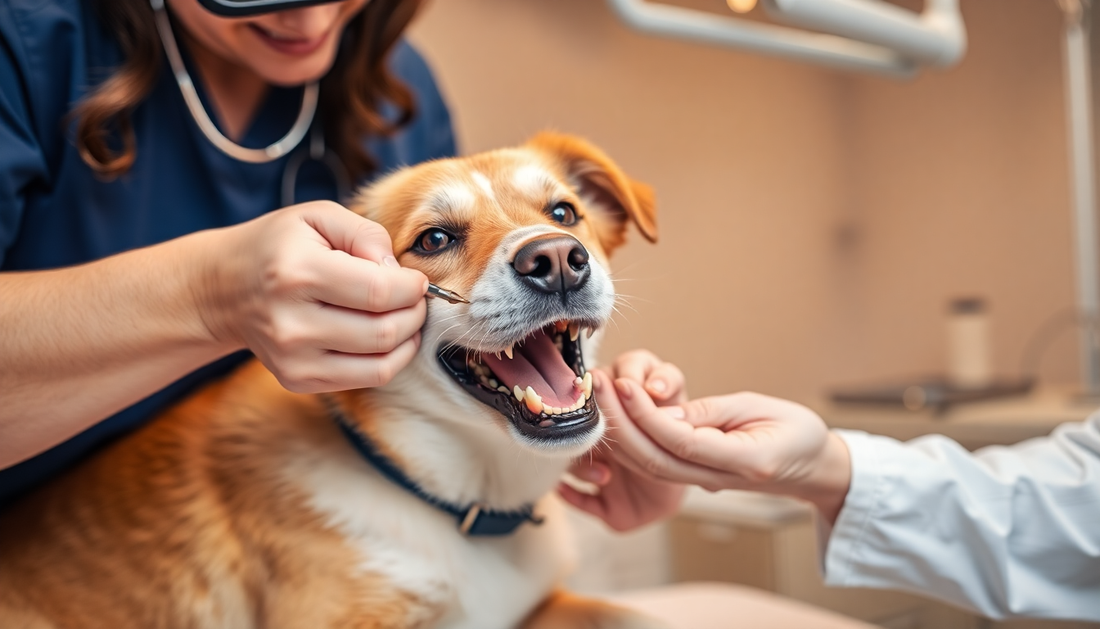
The Ultimate Guide to Pet Dental Health: Keeping Your Furry Buddy's Smile Bright
Share
As pet owners, we often prioritize the overall health and well-being of our furry companions, but one crucial aspect that can sometimes be overlooked is their dental care. Just like humans, dogs and cats require regular attention to their oral hygiene to maintain a healthy, happy smile. In this comprehensive guide, we'll explore the importance of pet dental health, provide practical tips for at-home care, and offer insights on when to seek professional veterinary assistance.
Understanding Pet Dental Disease
Dental disease is one of the most common health issues affecting dogs and cats, with studies showing that up to 80% of pets over the age of three have some form of dental disease. This can range from mild plaque buildup to severe gum inflammation, tooth decay, and even tooth loss. Left untreated, these problems can lead to more serious complications, such as infections, pain, and even organ damage.
The warning signs of dental problems in pets can be subtle, but it's important to be on the lookout for:
- Bad breath
- Excessive drooling
- Difficulty chewing or eating
- Redness or swelling of the gums
- Loose or missing teeth
- Pawing at the mouth
Addressing these issues early on can not only improve your pet's oral health but also contribute to their overall well-being. Dental disease has been linked to a range of systemic health problems, including heart, kidney, and liver disease, making consistent dental care a crucial part of your pet's preventive healthcare routine.
Dental Care Basics for Dogs
Brushing your dog's teeth may seem like a daunting task, but with the right approach, it can become a routine part of their grooming regimen. Start by introducing the process slowly, using positive reinforcement and treats to make it a pleasant experience. When brushing, use a soft-bristled toothbrush and pet-safe toothpaste, gently cleaning all surfaces of the teeth.
In addition to regular brushing, there are a variety of dental chews and products designed to help keep your dog's teeth clean. Look for options that have the Veterinary Oral Health Council (VOHC) seal of approval, as these have been proven effective in reducing plaque and tartar buildup. Some popular choices include:
- Dental chews and treats
- Water additives
- Dental wipes or sprays
- Dental-friendly toys
For dogs with particularly stubborn bad breath, natural solutions like adding a teaspoon of baking soda to their water or offering crunchy fruits and vegetables can also help freshen their breath.
Dental Care Basics for Cats
Feline dental care can present unique challenges, as cats are often less cooperative when it comes to tooth brushing. However, there are still plenty of ways to support your cat's oral health at home. Start by gently wiping their teeth with a soft, damp cloth or using dental wipes designed for cats.
When it comes to dental products, cats tend to prefer smooth, soft textures over hard chews. Look for dental treats, food toppers, or water additives that are specifically formulated for cats. You can also encourage your feline friend to chew on dental-friendly toys or scratching posts, which can help remove plaque and tartar.
As with dogs, regular veterinary check-ups are essential for catching any dental issues early on. Your veterinarian may recommend professional cleanings or other treatments to keep your cat's teeth and gums healthy.
Advanced Dental Care Strategies
For pet owners looking to take their dental care routine to the next level, there are a few additional strategies worth considering:
Dental water additives: These products, which are added to your pet's drinking water, can help reduce plaque and tartar buildup. Look for options that have been approved by the VOHC for maximum effectiveness.
Specialized toothpaste: While regular pet toothpaste is suitable for most pets, some animals may benefit from specialized formulas, such as those designed for sensitive teeth or to address specific dental concerns.
Comprehensive dental care routine: Develop a well-rounded dental care routine that includes regular brushing, dental chews, and professional cleanings. Consistency is key to maintaining your pet's oral health.
Conclusion
Maintaining your pet's dental health is a crucial aspect of their overall well-being. By understanding the warning signs of dental disease, implementing effective at-home care, and working closely with your veterinarian, you can help ensure your furry buddy's smile stays bright and healthy for years to come. Remember, prevention is key, so start caring for your pet's teeth today and enjoy the many benefits of a happy, healthy pet.
